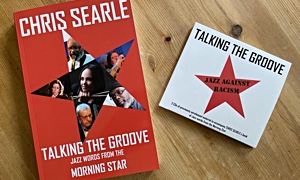Home » Jazz Articles » Book Review » Amy C. Beal: Carla Bley
Amy C. Beal: Carla Bley
 Carla Bley
Carla BleyAmy C. Beal
Softcover, 114 pages
University of Illinois Press
ISBN: 9780252078187
2011
Remarkably, this is the first detailed, published study of the career and music of Carla Bley, the distinguished composer, keyboardist, band leader and activist. It is the seventh volume in the University of Illinois' American Composers series, following studies of Lou Harrison, John Cage, Dudley Buck, William Grant Still, Rudolf Friml and Elliott Carter.
It is ironic, but also gratifying, that Carla Bley has been published by a university press and that it is written primarily for college music students. For Bley, like so many great jazz musicians, is an autodidact. Born Lovella May Borg in Oakland, California, in 1936, she learnt the rudiments of music from her piano playing father; but her jazz education came in the clubs—first, as a "cigarette girl" (the only way as a young woman she could afford to hear jazz live), and, later, on the bandstand.
As Jazz Studies departments become increasingly central to the development of young musicians, it is salutary for academics to be reminded that three years on campus is not the only way to learn jazz—and not necessarily the best way, either.
Bley's music has been relatively well documented because early on she took her career under her own control, co-founding Watt Records and the self-help distributor, New Music Distribution Service. Landmark recordings include Escalator Over The Hill (JCOA, 1971), Fleur Carnivore (Watt, 1989), The Carla Bley Big Band Goes To Church (Watt, 1996) and Looking For America (Watt, 2003), all composed for big or little big bands. A quartet album, The Lost Chords (Watt, 2004), is another highpoint. Beal discusses all these works, and more.
Carla Bley is less concerned with Bley's personal history. She has worked with such fellow luminaries as pianist Paul Bley (her first husband), trumpeter/trombonist Michael Mantler (her second husband), bassist Charlie Haden (in the Liberation Music Orchestra), multi-instrumentalist Don Cherry, singer/composer Robert Wyatt, bassist Steve Swallow (her longtime and continuing partner) and vibraphonist Gary Burton, whose A Genuine Tong Funeral (RCA, 1968), Bley composed. With only 114 pages at her disposal, Beal has little space to go into anything other than Bley's music.
Carla Bley benefits from interviews the author—a professor of music at the University of California, Santa Cruz—conducted with Bley, her daughter, Karen Mantler, Swallow and other key collaborators. This is, primarily, a textbook, but is commended to the general reader.
< Previous
Reuben Wilson: Revisited
Next >
Undeniable
Comments
Tags
carla bley
Book Reviews
Chris May
United States
Lou Harrison
John Cage
William Grant Still
Paul Bley
Michael Mantler
Charlie Haden
Don Cherry
Robert Wyatt
Steve Swallow
Gary Burton
Karen Mantler
For the Love of Jazz
 All About Jazz has been a pillar of jazz since 1995, championing it as an art form and, more importantly, supporting the musicians who create it. Our enduring commitment has made "AAJ" one of the most culturally important websites of its kind, read by hundreds of thousands of fans, musicians and industry figures every month.
All About Jazz has been a pillar of jazz since 1995, championing it as an art form and, more importantly, supporting the musicians who create it. Our enduring commitment has made "AAJ" one of the most culturally important websites of its kind, read by hundreds of thousands of fans, musicians and industry figures every month.






















